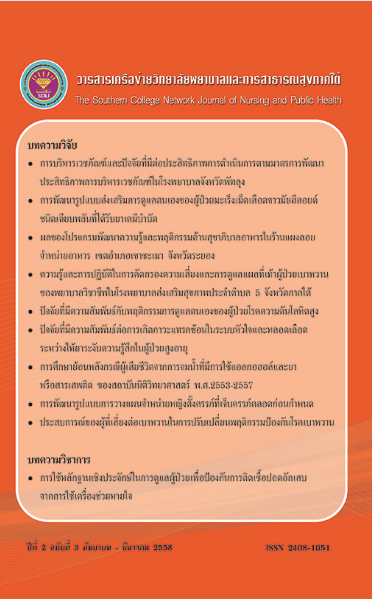การใช้หลักฐานเชิงประจักษ์ ในการดูแลผู้ป่วยเพื่อป้องกันการติดเชื้อปอดอักเสบจากการใช้เครื่องช่วยหายใจ
คำสำคัญ:
การเกิดปอดอักเสบจากการใช้เครื่องช่วยหายใจ, การใช้หลักฐานเชิงประจักษ์, Ventilator-Associated Pneumonia (VAP), Evidence-Based Practiceบทคัดย่อ
บทความนี้เขียนขึ้นจากการทบทวนวรรณกรรม การรวบรวมความรู้จากการนำหลักฐานเชิงประจักษ์มาใช้ในการดูแลผู้ป่วยที่ใส่ท่อช่วยหายใจร่วมกับเครื่องช่วยหายใจ เพื่อป้องกันการเกิดปอดอักเสบจากการใช้เครื่องช่วยหายใจ มีวัตถุประสงค์เพื่อเผยแพร่ความรู้จากการนำหลักฐานเชิงประจักษ์มาใช้ใน การดูแลผู้ป่วยที่ใช้เครื่องช่วยหายใจในหอผู้ป่วยและเป็นแนวทางปฏิบัติให้กับพยาบาลที่เกี่ยวข้อง
ผู้ป่วยที่มีอาการอยู่ในระยะวิกฤตจำเป็นต้องใส่ท่อช่วยหายใจร่วมกับการใช้เครื่องช่วยหายใจ ซึ่งผู้ป่วยอาจเกิดภาวะแทรกซ้อนตามมา คือการเกิดปอดอักเสบจากการใช้เครื่องช่วยหายใจ ภาวะแทรกซ้อนดังกล่าวสามารถป้องกันได้โดยพยาบาล การใช้หลักฐานเชิงประจักษ์หรือแนวปฏิบัติที่ เหมาะสมในแต่ละบริบท เพื่อป้องกันการเกิดปอดอักเสบจากการใช้เครื่องช่วยหายใจ ซึ่งบทความนี้ นำเสนอการนำหลักฐานเชิงประจักษ์ 5 ด้าน ได้แก่ การดูแลความสะอาดในช่องปากและฟัน การดูแล จัดท่านอนและการพลิกตะแคงตัว การดูแลให้อาหารทางสายยาง การดูดเสมหะและการดูแลท่อทางเดินหายใจ และส่วนประกอบของเครื่องช่วยหายใจ เพื่อป้องกันและลดการเกิดปอดอักเสบจากการใช้เครื่องช่วยหายใจ
Evidence-Based Practices In Prevention of the Ventilator-Associated Pneumonia (VAP)
This article was gathered from literature review. Knowledge from an empirical evidence; use of evidence-based practices in nursing care of patients with endotracheal intubation and mechanical ventilation were applied to prevent ventilator-associated pneumonia (VAP). The purpose of this article was to disseminate knowledge from the evidence-based practices used to care for patients with endotracheal intubation and mechanical ventilation in wards. This empirical evidence could be further developed to be a clinical practice guideline.
Patients who have suffered a crisis required endotracheal intubation with mechanical ventilation. The patient may cause subsequent complication—VAP. Such complication can be prevented by a nurse. Using evidence-based practice/guideline that is appropriate in each context can prevent the VAP. This article presents the evidence-based practice regarding the nursing care to prevent the VAP including: 1) maintaining proper mouth care, 2) head position care and changing position, 3) care of feeding tube, 4) suctioning, and 5) care of respiratory tract and ventilator’ s apparatuses.
ดาวน์โหลด
เผยแพร่แล้ว
ฉบับ
ประเภทบทความ
สัญญาอนุญาต
1. บทความหรือข้อคิดเห็นใด ๆ ที่ปรากฏในวารสารเครือข่าย วิทยาลัยพยาบาลและการสาธารณสุขภาคใต้ ที่เป็นวรรณกรรมของผู้เขียน บรรณาธิการหรือเครือข่ายวิทยาลัยพยาบาลและวิทยาลัยการสาธารณสุขภาคใต้ ไม่จำเป็นต้องเห็นด้วย
2. บทความที่ได้รับการตีพิมพ์ถือเป็นลิขสิทธิ์ของ วารสารเครือข่ายวิทยาลัยพยาบาลและการสาธารณสุขภาคใต้








